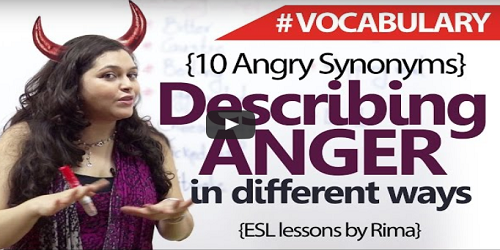In this spoken English lesson you will learn how to speak in English about different sides of anger.
Anger is a very complicated emotion that we all go through, how about learning synonyms of anger which would help you to improve you English Vocabulary. Here, You Will Learn 10 synonyms and different sides for the word anger that you may come across with someone.Bitter
Bitter is a taste in our mouth, it means anger which is seething and resentful. Somebody who harbours negative feelings about you is somebody who is bitter about you. So being bitter with someone has a lasting negative impact of anger on them.Example : When Sally and I had a massive fight, She remained bitter with me for the next two years.
Caustic
Caustic is another form of anger which is very hurtful. Being caustic also means being sarcastic. This anger comes out as negativity in the form of verbal expressions. When you are caustic to someone you make hurtful comments about them.Example : Sally made some caustic remarks about me at the dinner table.
Boiling
When someone’s temper becomes boiling, it means they are very angry. Here the word boiling refers to the temperature, as water boils it becomes hot enough to burn you, which means when you are boiling with anger you extremely angry.Example : When I reached office late, my boss was boiling with rage.
Aggravated
Aggravated is to be aggressive or to be violently angry with someone. When someone is aggravated with you, you can expect that person to pick up something and throw it at you.Example : When Sally and I had that crazy fight, she was so aggravated that I thought, I need to run for my life.
Cheesed off
Cheesed
off again means someone is very angry with you. This term is a slang
and also means someone has gotten angry with you in an instance or in a
fast fashion. It short it means getting angry quickly.
Example : My behavior at the party really cheesed off my family.
Example : My behavior at the party really cheesed off my family.
Ticked off
The term ticked off has similar meaning to cheesed off, but has a slight or a subtle difference in it’s meaning. Now, ticked off remind you of the ticking of a clock, So people get ticked off due to a particular type of behavior, comment or an incident. Getting ticked off means, getting angry instantly.Example : Sally is ticked off with me because of my comment on her Facebook post.
Vitriolic
Vitriolic means someone is ready to spew venom at you. When someone is vitriolic, they are angry enough to criticize you, put you down and use abusive language against you.Example : After her breakup, Sally went vitriolic about her boyfriend.
Antagonistic
Antagonistic
is a very loaded term. It means someone is so angry with you that they
can become you enemy. When someone is antagonistic with you, you both
have opposite opinions and thinking patterns.
Example : I kept my mouth shut, because I didn’t want to antagonize Sally.
Example : I kept my mouth shut, because I didn’t want to antagonize Sally.
Hopping mad
Now, this term has nothing to with being mad or hopping or skipping or jumping. When somebody is hopping mad with anger, it means they have to jump up and down to calm their anger.Example : When I was made to wait in the queue for whole three hours, I was hopping mad.
Livid
When you are livid, you lose complete control of your senses due to anger. So, when somebody is livid, they can do anything to you, they can slap you, they can hurt you because they are so angry that they are unable to control themselves.Example : When I saw a little boy hit a powerless little puppy, I was livid with rage.
Like Us On Facebook For Daily FREE English Learning Tutorials
Learn Online English Grammar | Vocabulary Words With Meaning and Sentence in English | Free Complete English Grammar Video Tutorial Series | Tense in English Video | Basic english Learning Videos Tutorials | English Idioms and Phrases Tutorial | Daily Use English Words And Sentences | English Grammar Verb Tutorial | Confusing Words In English with Sentences | English Phrasal Verbs With Meaning and Examples | Prepositions in English Grammar

Comments
Post a Comment